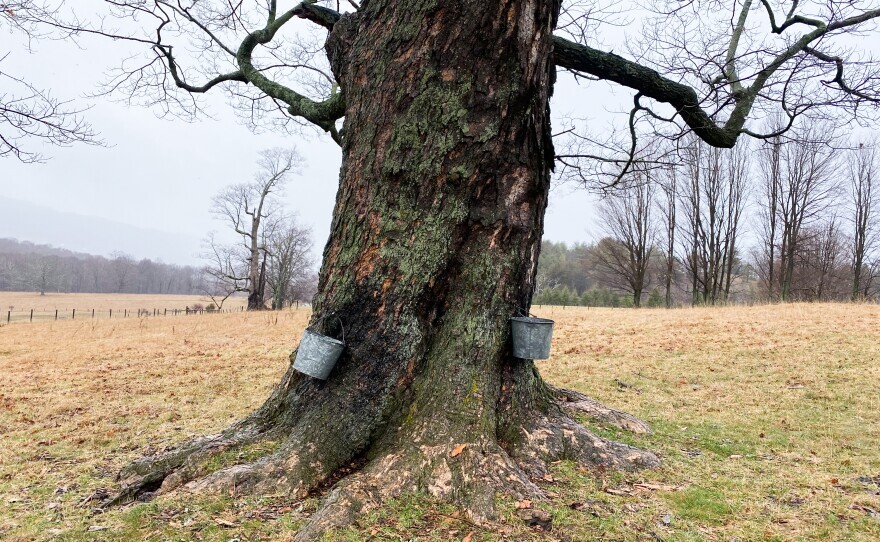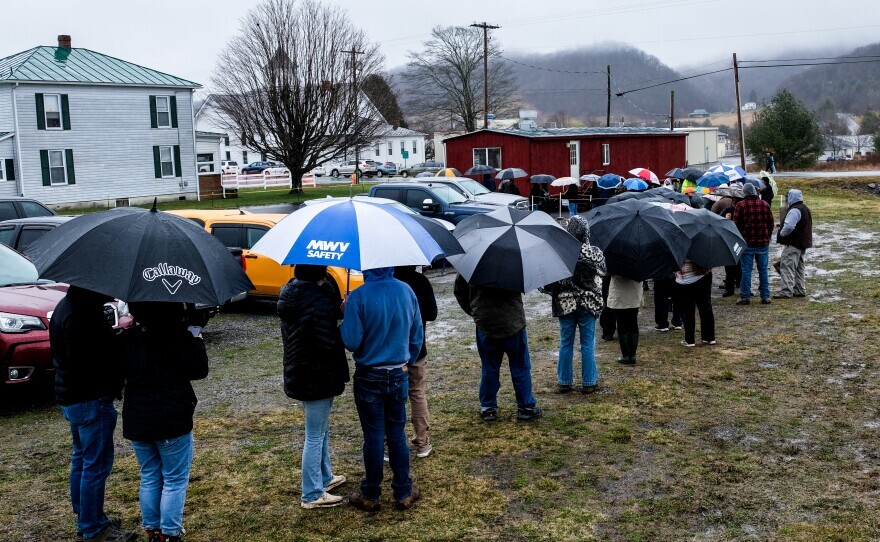It’s one of the southernmost points in the U.S. for maple syrup production.
Highland County’s sheriff, a retired corporate lawyer, a teacher-turned-president of the local Chamber of Commerce and five dozen other volunteers spent the past two weekends in a trailer making the Mill Gap Ruritan Club’s famous maple doughnuts.
The pastry is one of the most anticipated features of Highland County’s annual Maple Festival. It’s light enough to almost pass for health food — yet deep-fried and covered in maple frosting that’s sweet in an understated way.
And while the civic organization sold 48,000 over the course of two weekends, the doughnuts almost didn’t happen this year.
Jeff Burton, the 74-year-old retired corporate lawyer and a former president of the club, explained the situation: “We had a slight problem about 9:30 this morning,” he said while standing at his assigned post: the standing dough mixer. “The belt — which is like an assembly line operation, where the doughnut dough is stamped in the doughnut shape — that belt broke.”
Instead, volunteers had been hand stamping the doughnuts into shape while the current president tried to locate a new belt and another group worked to repair the ripped one.
Whatever the club was working through inside the trailer, outside, the line stretched deep into the parking lot, despite a cold rain. Earlier that morning the crew had announced the delays, saying it could be hours before doughnut production returned to normal.
No one in line budged.
Highland is the least populous county in Virginia. Known as “Little Switzerland,” it’s nestled about 3,500 feet up in the Allegheny Mountains right against West Virginia. That location leaves the county isolated but is also why it's one of the southernmost points in the U.S. where maple trees grow and people can produce syrup. The practice was picked up from Native Americans and has been a part of life there since Euro-American settlers arrived in the mid-1700s.
In 1959, it gained a new level of recognition with the Maple Festival’s founding. In the decades since, syrup has grown to play an essential role in funding life in the county. Each year tens of thousands of people make the trek for the festival’s pancake breakfasts, maple doughnuts, handcrafted goods and tours of the sugar camps where the syrup is produced.
This year, Alan Yokum is one of those people. Near the front of the line, he and his family had waited an hour and a half and said, so far, it was worthwhile.
“We come every year, at least one of the weekends,” Yokum said. “And there's normally a good weekend weather-wise and one that's not so good — and this is the not-so-good one.”
Yokum, a former radio broadcaster from Petersburg, has been attending with his family for about 20 years. And they’re not alone. A 2022 Virginia Tech economic impact report on the festival found more than two-thirds of attendees had been before, and the average visitor had been coming back13 years.
A perfectly tuned microeconomic system
Chris Swecker grew up in Monterey and spent many festivals as a kid working doughnut production and pancake breakfasts. Nowadays, he coordinates the festival as executive director of Highland County’s Chamber of Commerce.
“We say it's our main economic driver,” he said. “And now that we have some figures to back that up, we feel like it's true.”
With the 2022 VT economic impact report estimating the festival brought more than $2 million in spending to the county on the high end, Swecker’s got a point. That’s massive in a county with a gross domestic product that was only a little more than $90 million the same year.
For scale, Highland’s GDP was less than one-third of 1% of Richmond’s ($28.7 billion) during the same year. That means an event in Richmond would have to bring in $626 million to have the same impact, proportionally.
The festival has a reciprocal nature to it, according to Swecker. “People are volunteering to work,” he said. “And it comes back and helps them get through the entire year.”
On a small scale, that looks like the Mill Gap Ruritan club putting the majority of the roughly $46,000 earned during the festival right back into the community, according to Marty Leech, president of the Chamber of Commerce’s board.
That money goes to a variety of programs: local volunteer fire departments and rescue squads, the Highland Medical Center, the Highland Food Pantry, programs for children and older adults and more.
Highland County’s sugar camps, sometimes called a sugar house or shack, both drive the festival and rely on the revenue generated at each year’s event.
Having been around at least five generations, Rexrode’s Sugar Orchard is one of the oldest camps in the county. George Taylor married into the Rexrode family about 40 years ago and has often worked on the family’s sugar camp.
Taylor, age 79, said the festival brought big changes to syrup production in Highland. Many farms have now retired wood-fired boiling pans in favor of oil-fired evaporators and left gravity powered tubing set ups for vacuum tube sap collection.
But Rexrode’s, now run by Taylor’s nephew Derek Rexrode, continues to produce the traditional way using a centuries-old production method.
“I just grew up with it. When I was young, my grandfather and my father were making syrup, so I just kinda started doing it,“ Rexrode said. “It was just always my favorite time of the year, I always looked forward to it.”
The process starts toward the end of winter, when daytime thaws break frozen nights. The farm taps about 1,000 maples and the sap — known as sugar water — then flows through tubes back to camp where it's boiled over burning hardwood. It takes about 50 gallons of sugar water to make 1 gallon of syrup.
According to Rexrode, it’s not the most efficient way to make syrup but there’s a reason behind the sugar orchard’s methods.
“We like doing it with wood: It gives it a unique taste, kind of smoky taste, and it cooks it slower,” he said. “You can buy syrup at any grocery store now, so we like to say, ‘You can come to Highland County and get something a little unique from us.’”
Rexrode’s customers seek out the family syrup’s distinct flavor and have for generations.
“They came here with their parents and now they come and bring their kids,” he said. “A lot of people come just because they know they're going to get wood-cooked syrup.”
Beyond the taste, Rexrode appreciates the connection to past generations that comes from doing the same thing, on the same land, five generations after his family began doing it: “We're still using the wood-fired [approach] and a lot of our trees here are 200 years old, and they've been tapped for generations.”
Derek Rexrode is running the operation at a time when the county and rural America at large are in crisis.
Record high farming costs, rising farmland values and rural gentrification have combined with lower crop prices as production has become globalized and left many smaller farmers with little choice but to fold as agribusiness takes over.
In 1959, when the Highland County Maple Festival started, Virginia had about 98,000 farms, historical federal Census of Agriculture records show. In 2022, there were 39,000.
County-level data shows Highland followed that downward trend, with the number of farms shrinking between 1959 and 2022 by about half to 258.
But talking to VPM News/WMRA, the 33-year-old Derek Rexrode mostly dwelled on gratitude.
“Most people don't have the opportunity I have, they don't have the farm and maple trees. And it's easy to say ‘All the young people are leaving,’ but if they don't have the —”
He paused, then repeated, “I'm lucky to have the opportunity I had.”
His uncle, George Taylor, explained a similar philosophy to festival-goers beside a steaming pan at the sugar camp.
“You look around, the trees here in Highland, they're native to this area,” he said. “About everything you see is a maple tree, sugar maple. The soil conditions, the altitude and the climate, everything is just right.”
He told the group that when he first married into the Rexrode family, he asked his father-in-law why they didn’t just sell firewood because of how much they burned to make syrup.
“He just said, ‘Because.’ That was the answer he gave me,” Taylor said. “And I thought he was kind of fluffing me off. But when I thought about it, that was a pretty profound answer because the trees are here and he was third- or fourth-generation: His granddaddy did it, and why not do it?”
Between having the third oldest population by median age (58 years old) in Virginia, climate change pushing up the maple season and housing costs rising more than 40% in five years, living in Highland County has tangible challenges. Swecker acknowledged that, but he said people come together to fix them, adding a lot of that work is made possible by the festival itself.
“We’re getting more successful in having people here year-round, but this is typically the gateway for people to learn about Highland,” he said. “Hopefully, once they see it and see what we're about and the rural country charm, [they’ll] tend to come back.”
Despite the stress and responsibility of coordinating the festival now, Swecker said he still looks forward to it all year.
“Here in Monterey, there's a smell that comes over and it's a lot of the doughnuts cooking. It's a grease smell, but it's a comforting smell,” he said. “I was walking up and I smelled it, and was like, ‘Yeah, it's Maple Festival time.’ You just know it.”











